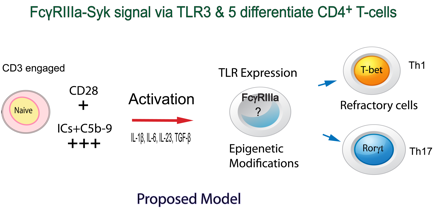Session Information
Session Type: ACR Poster Session C
Session Time: 9:00AM-11:00AM
Background/Purpose: To delineate mechanism of FcγRIIIa-pSyk signal in TH17 and IFN-γhigh subset development. To examine whether Toll-like receptor signaling play a role in CD4+ T-cell differentiation upon FcγRIIIa ligation by immune complexes (ICs).
Methods: Purified naïve CD4+CD45RA+ T-cells were co-stimulated with plate bound ICs+C5b-9 or anti-CD28 in the presence of anti-CD3 and polarized in TH17 cytokine milieu. Flow analysis was performed for IFN-γ, IL-17A, IL-22 cytokines and pSyk. The CD4+ T-cells from SLE patients (n=40) were analyzed for pSyk and CD25, CD69 and CD98. TLR signaling genes were analyzed by RT2 Profiler QT-PCR arrays. Association of HMGB1 and MyD88 with FcγRIIIa was examined using IP and Western blotting. Cell staining was performed for co-localization of HMGB1, MyD88, TLR3, and TLR5 with labeled ICs.
Results: We show that the activated naïve CD4+ T-cells express FcγRIIIa, which upon IC ligation signals via pSyk and drive CD4+ T-cell differentiation in vitro. In SLE patients activated CD4+ T-cells that express CD25, CD69 and CD98 show pSyk. These pSyk+ cells express ICOS but not PD1. Both MyD88 dependent and independent TLRs, 2 (5.50-fold), 3 (9.89), 5 (5.17), 8 (5.09), and 10 (5.16) were upregulated. TLR7 and 9 did not show significant increase. Adaptor and TLR interacting proteins BTK, HMGB1, HRAS, and MyD88 were upregulated. Labeled ICs co-localize with HMGB1 and MyD88 in CD4+ T-cells. Western blots of IPs generated with anti-FcγRIIIa antibody show association of HMGB1 and MyD88 with these receptors. These results suggest a role for FcγRIIIa-pSyk signaling by upregulation of TLR pathway in defining adaptive immune responses in autoimmune pathology.
Conclusion: Recently TLR-dependent T-cell activation in autoimmunity has been documented. While TLR2 provide a co-stimulatory signal to CD4+ T-cells, TLR4 enhance activation and persistence of TH17 and TH1 cells. TLR3 contribute to the development of TH1 cells. We observed up-regulation of TLR-signaling pathway genes in CD4+ T-cells from FcγRIIIa ligation by SLE-ICs. The pSyk+ CD4+T-cells in SLE patients produce IFN-γ and IL-17A suggesting a role of ICs in driving T-cell mediated disease pathology. A role for FcγRIIIa was further confirmed from in vitro generation of TH1 and TH17 like population. We propose that FcγRIIIa-pSyk signal drives the generation of refractory TH1 and TH17 cells that override the suppression from Tregs. Such cells are produced in response to activation from anti-CD3+anti-CD28 co-stimulation and LPS. Further MyD88 ablation impairs both TH1 and TH17 responses. Our data describe a new role for FcγRIIIa-pSyk mediated signaling in production of pro-inflammatory CD4+ T-cells that are refractory to suppression by Tregs.
To cite this abstract in AMA style:
Chen C, Bi Y, Moore T, Chauhan AK. FcγRIIIa-Psyk Signaling up-Regulates TLR3 and TLR5 in Human Naïve CD4+ T-Cells [abstract]. Arthritis Rheumatol. 2015; 67 (suppl 10). https://acrabstracts.org/abstract/fcriiia-psyk-signaling-up-regulates-tlr3-and-tlr5-in-human-nave-cd4-t-cells/. Accessed .« Back to 2015 ACR/ARHP Annual Meeting
ACR Meeting Abstracts - https://acrabstracts.org/abstract/fcriiia-psyk-signaling-up-regulates-tlr3-and-tlr5-in-human-nave-cd4-t-cells/

